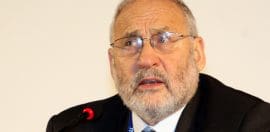COVID-19 holds a mirror up to us

10 April 2020 at 11:00 am
Once we get a chance to catch our collective breath we need to lift our gaze and ask ourselves: what kind of world do we want to live in, writes Jesuit Social Services CEO Julie Edwards, who shares her thoughts on what that world might look like.
In this global pandemic, everything feels strange. The ground is shifting beneath us. We sense huge elemental forces at work, and see cracks in our society appear. Yet, these fault lines have been there all the time. The ones who know this first hand are the ones who were already living a precarious life before COVID-19 – people who live a hand-to-mouth existence, who sleep rough, who can’t get work, who try to survive on next to nothing, who’ve fled their homelands hoping to find sanctuary here in Australia. They’re often referred to as dole-bludgers, “takers” “leaners”, queue jumpers. And beyond our shores, most people in the world know it. Those of us who accompany people on the margins know it, too.
COVID-19 has rendered those fault lines into massive cracks that threaten to fracture the entire edifice of modern society. Suddenly we’re more aware of what it’s like to be stranded in a country not our own, not allowed to board a plane with our loved one whom we’re told isn’t a “direct relation”, and being directed to go our separate ways. Suddenly we gain insight into what it’s like to wait in queues outside Centrelink, or to dangle for hours on the phone in the hope of getting to talk to an actual person; we are the ones wondering how we’ll pay for food, for rent, for medications; we are the ones whose mental health is shaky. Yet, many of us still have a roof over our heads, family that can pull together, social supports – it’s a temporary glimpse into a world that other people inhabit full time and permanently.
What are we going to do with our newfound insight? Many are doing it already: reaching out, paying for someone’s groceries at the checkout, covering someone’s rent, dropping off a box of food to a neighbour. Our desire for solidarity surfaces. Our understanding of our interconnectedness kicks in. Our fundamental impulse to love ignites.
“It’s time to challenge the dominant neoliberal narrative that unquestioningly promotes the idea that the private sector does things better.”
This is a start, and it must continue. But once we get a chance to catch our collective breath we need to lift our gaze and ask ourselves: what kind of world do we want to live in?
From my vantage point, leading a community service organisation that accompanies and supports people who were already living on the fault lines that gaped open some time ago, I’ve got some thoughts. Others, who work in other systems, such as health and education, and those who access services from them, will see their version of similar things.
From where we sit at Jesuit Social Services we’ve had a clear view for some time of the detrimental social, economic and environmental policies that don’t work for many in our community, let alone in our world. We’ve lamented as successive governments have adopted and embedded neoliberal principles and practices in economic and social policy. As they have retreated, we’ve seen the encroachment of the private sector, visible in the increasing penetration of large multinational for-profit companies into all aspects of our lives, including the provision of essential social services. Service provision is now punitive and links a person’s social worth to their participation in the economy. Personal responsibility is emphasised, structural and systemic issues are downplayed, and the market is seen to solve economic and social problems despite the reality that social services often exist to address market failure. Our robust public service has been diminished and our public assets sold, while environmental policies prioritise the short-term greed of a few at the long-term expense of us all.
It’s time to challenge the dominant neoliberal narrative that unquestioningly promotes the idea that the private sector does things better – more effectively, more efficiently. It is a myth that publicly owned and run systems are not the backbone of any just and sustainable society. Neoliberalism sheets responsibility for poverty and disadvantage back to the individual rather than acknowledging the broader social and economic factors that drive these. And we should reject the sales pitch that sells the proposition that profits for some somehow foster individual and community wellbeing.
This crisis has already brought forth new responses and laid bare the false ideological thinking underpinning a number of cruel policies. Overnight it’s recognised that people can’t live on $40 a day. Overnight we’ve scrapped mutual obligation. Overnight we’ve talked about moving non-violent offenders from prison back to the community – back where they always should have been.
“It would be a grave injustice if the people who bore the brunt of the old world are made to bear the brunt of the new.”
Right now we’re in an in between state. There was a life before coronavirus, and there will be a life afterwards. How we get from the before to the after is a challenge for all of us, and we don’t have the answers yet. But there are choices we can make to influence what the new world will look like. And those choices will matter.
We have a chance to transform to a more just society. It would be a grave injustice if the people who bore the brunt of the old world are made to bear the brunt of the new, and the least powerful in our society are crushed.
For people on the margins, the old world was not a good place to live. This is a wake-up call to shore up basic systems and make them equitable.
We have a great community, but we can make it even stronger – with positive leadership, good will and a shared vision. When you have the most vulnerable people in mind, you build the kind of social infrastructure that benefits everyone. Governments have stepped in when people have needed them. Don’t let them retreat again.
Let’s instead build communities of justice. Let’s uphold democratic processes, citizen participation and social inclusion. Let’s recognise that social and environmental justice are intrinsically linked. Let’s celebrate solidarity.
Climate change should have brought home to us that we’re all interconnected. We didn’t heed the warning. Let’s not miss the lesson COVID-19 is providing.








Excellent reflection Julie. Let’s hope for the change of heart you articulate so well. Reflections such as yours gives hope to all of us in these unsettling times. Thank you.
You are so right.
It is hard not to feel helpless and hopeless. But there are other little people making a difference and they give me hope and belief in the promise of Life.